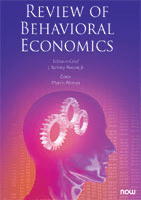
Review of Behavioral Economics
Scope & Guideline
Transforming Economic Theory Through Behavioral Insights
Introduction
Aims and Scopes
- Behavioral Insights in Economic Decision-Making:
The journal focuses on how psychological factors influence economic choices, integrating theories of bounded rationality, heuristics, and biases. - Interdisciplinary Approaches to Political Economy:
It highlights the intersection of behavioral economics with political science, examining how behavioral insights can inform public policy and governance. - Impact of Social and Cultural Factors on Economics:
The journal explores how social identity, cultural context, and norms affect economic behavior, including topics like inequality, gender, and trust. - Methodological Innovations in Behavioral Research:
It encourages the use of diverse methodologies, including experimental designs, literature reviews, and theoretical frameworks, to deepen the understanding of economic behavior. - Application of Behavioral Economics in Policy Making:
The journal emphasizes the practical implications of research findings for public policy, particularly in areas like nudges, regulatory frameworks, and economic interventions.
Trending and Emerging
- Behavioral Political Economy:
There is an increasing focus on how behavioral insights can inform political economy, exploring the implications of behavioral economics for governance, policy-making, and public choice. - Impact of Digitalization and Technology on Economic Behavior:
Research on how technological advancements, such as cryptocurrencies and digital platforms, influence decision-making and economic outcomes is gaining traction. - Cultural and Social Influences on Economic Decisions:
Emerging studies are delving into how cultural and social factors, including identity and community norms, shape economic behaviors and preferences. - Behavioral Responses to Global Challenges:
The journal is trending towards exploring behavioral responses to pressing global issues, such as pandemics and environmental concerns, and their implications for economic behavior. - Integration of Neuroscience with Behavioral Economics:
There is a growing interest in the intersection of neuroscience and behavioral economics, particularly in understanding the cognitive processes behind economic decision-making.
Declining or Waning
- Traditional Economic Models:
There has been a noticeable decline in papers focusing solely on classical economic models without incorporating behavioral perspectives, suggesting a shift towards more integrated approaches. - Purely Theoretical Economic Constructs:
The emphasis on purely theoretical constructs has waned, as the journal increasingly favors empirical studies that provide actionable insights into economic behavior. - Limited Focus on Isolated Economic Phenomena:
Research that examines isolated economic phenomena without considering broader behavioral contexts is appearing less frequently, indicating a trend towards more holistic analyses. - Decline of Behavioral Economics as a Separate Discipline:
As behavioral economics becomes more mainstream, the journal reflects this integration by focusing less on the distinct boundaries of the field and more on its applications across various domains.
Similar Journals

ECONOMETRICA
Leading the way in cutting-edge economic research.ECONOMETRICA, published by Wiley, is a leading journal in the field of economics and econometrics, renowned for its rigorous and cutting-edge research contributions. With an ISSN of 0012-9682 and an E-ISSN of 1468-0262, this esteemed journal holds a prestigious position in the academic landscape, classified in the top quartile (Q1) for both Economics and Econometrics as of 2023, and ranked 42 out of 716 in its field, placing it in the 94th percentile according to Scopus metrics. The journal's scope encompasses a diverse range of topics aimed at advancing economic theory and its practical applications, making it an essential resource for scholars, practitioners, and students alike. Although it operates under a subscription model, the depth and quality of research published in ECONOMETRICA underscore its significance as a cornerstone for intellectual discourse and innovation within the field. Based in the United Kingdom, at 111 River St, Hoboken, NJ 07030-5774, ECONOMETRICA continues to attract high-caliber contributions that shape the future of econometric research.
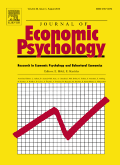
JOURNAL OF ECONOMIC PSYCHOLOGY
Exploring the Mind Behind Economic ChoicesThe Journal of Economic Psychology is a premier academic publication dedicated to advancing the understanding of the interrelations between economic behaviors and psychological processes. Published by Elsevier, this journal has established itself as a critical resource for researchers and practitioners in the fields of *Applied Psychology*, *Economics and Econometrics*, and *Sociology and Political Science*, boasting an impressive *Q1* ranking in each category as of 2023. Since its inception in 1981 and with a commitment extending to 2024, the journal provides a platform for high-quality, peer-reviewed research that influences both theoretical frameworks and practical applications. With a rich interdisciplinary approach, the journal addresses pressing issues at the intersection of economics and psychology, facilitating a deeper understanding of how psychological factors drive economic decisions. Researchers looking to share innovative findings, as well as professionals seeking to implement evidence-based practices, will find the *Journal of Economic Psychology* an invaluable asset in their work. The emphasis on rigorous methodologies and relevant topics makes this journal not just a repository of knowledge, but a beacon for future studies that link economic and psychological insights.

Annual Review of Financial Economics
Illuminating the Interplay of Economic TheoriesAnnual Review of Financial Economics, published by Annual Reviews, stands as a pivotal journal in the fields of Economics and Finance, recognized for its rigorous analysis and comprehensive reviews since its inception in 2010. With an impressive impact factor reflected in its Q1 ranking in both Economics and Econometrics and Finance for 2023, this journal serves as an essential resource for researchers, professionals, and students keen on understanding the dynamic interplay of financial theories and practices. The ISSN 1941-1367 and E-ISSN 1941-1375 signal its commitment to accessibility and dissemination of cutting-edge research within the community. Addressing crucial topics from market behavior to economic modeling, each annual volume synthesizes the latest findings and theoretical advancements, thus contributing significantly to the global discourse within financial economics. With its high Scopus rankings, including a finance rank of #75 out of 317, the journal continues to foster a deep understanding of financial systems and their implications, serving as an invaluable tool for anyone engaged in the broader economic landscape.
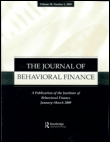
Journal of Behavioral Finance
Decoding Investor Behavior for Better OutcomesThe Journal of Behavioral Finance is a pivotal publication examining the intersection of psychology and finance, offering insights into the behavioral aspects that influence financial decision-making. Published by Routledge Journals, Taylor & Francis Ltd in the United Kingdom, this journal provides a platform for researchers and practitioners to engage with cutting-edge research that covers diverse topics such as investor behavior, market dynamics, and emotional finance. With an ISSN of 1542-7560 and an E-ISSN of 1542-7579, the journal has established itself with an impressive standing, achieving a Q2 ranking in Finance and a Q3 ranking in Experimental and Cognitive Psychology according to the 2023 category quartiles. Furthermore, it ranks in the top 74th and 73rd percentiles in their respective fields within Scopus. The Journal of Behavioral Finance not only disseminates scholarly research but also fosters critical discourse, essential for academics, industry professionals, and students seeking to deepen their understanding of behavioral finance dynamics.
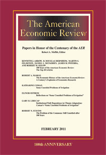
AMERICAN ECONOMIC REVIEW
Advancing Knowledge in Economics and Econometrics.AMERICAN ECONOMIC REVIEW, published by the American Economic Association, stands as one of the most prestigious academic journals in the field of Economics and Econometrics. With an impressive impact factor and ranking of #9 out of 716 in its category, this journal has achieved a notable position within the top 2% of journals globally, as evidenced by its Q1 classification in 2023. Covering a broad spectrum of economic theory and applied research, it serves as a primary platform for the dissemination of high-quality scholarly work, contributing significantly to the ongoing dialogue within the discipline. Although Open Access options are not available, the journal's rigorous peer-review process ensures that published articles uphold the highest standards of academic integrity and relevance. With coverage spanning from 1973 to 2024, the AMERICAN ECONOMIC REVIEW continues to be an essential resource for researchers, professionals, and students eager to stay at the forefront of economic thought and innovation.
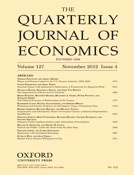
QUARTERLY JOURNAL OF ECONOMICS
Shaping Economic Policy Through Rigorous ResearchQUARTERLY JOURNAL OF ECONOMICS is a prestigious and long-established academic journal published by Oxford University Press Inc. With its origins dating back to 1886, this esteemed journal has continually provided a vital platform for the dissemination of cutting-edge research in the field of economics and econometrics. The journal holds an impressive Q1 ranking in the Economics and Econometrics category, positioning it at the forefront of scholarly contribution with a Scopus rank of #2 out of 716, reflecting its standing in the top 1% of the field. Although the journal is not open access, it offers a wealth of vital resources and insights that are indispensable for researchers, professionals, and students alike, as it aims to advance knowledge and influence economic policy and practice through rigorous academic inquiry.

Terra Economicus
Fostering Collaboration Across Academic FrontiersTerra Economicus, published by Southern Federal University, stands as a significant peer-reviewed academic journal that focuses on the intricate intersections of economics, law, political science, and sociology. With an ISSN of 2073-6606, this journal has carved out a commendable reputation within the academic community, as evidenced by its placement in various category quartiles: Q3 in Economics, Econometrics and Finance, Q1 in History, and Q2 in Law, Political Science, and Sociology as of 2023. Such rankings highlight the journal’s dedication to high-quality scholarship and its impact on interconnected social sciences. The journal not only aims to bridge diverse fields of study but also addresses contemporary issues that require a multidisciplinary approach. Hailing from the Russian Federation, Terra Economicus operates with an open access model, promoting widespread dissemination of knowledge. Its commitment to covering a broad scope of topics makes it a vital resource for researchers, practitioners, and students alike, providing insights and fostering dialogue across various academic disciplines.

THEORY AND DECISION
Exploring the Intersection of Theory and Practical Decision-MakingTHEORY AND DECISION is a prestigious academic journal published by SPRINGER, which has been a cornerstone of interdisciplinary research since its inception in 1970. With an ISSN of 0040-5833 and an E-ISSN of 1573-7187, this journal offers valuable insights into a range of fields, including Applied Psychology, Decision Sciences, Economics, and more. Holding a remarkable position within various quartile rankings, such as Q1 in Arts and Humanities and Q2 in Economics, it signifies the journal's impact and relevance in modern academic discourse. Although not presently open access, it remains accessible to researchers and institutions that prioritize impactful studies and theoretical advancements. The journal's objectives include exploring decision-making processes and theoretical underpinnings that inform practical applications across disciplines, making it an essential resource for academics, professionals, and students dedicated to advancing knowledge in their respective fields. THEORY AND DECISION continues to shape the landscape of interdisciplinary research, providing a platform for innovative ideas and discussions that are crucial in today’s complex world.
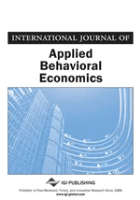
International Journal of Applied Behavioral Economics
Fostering impactful research in behavioral economics.International Journal of Applied Behavioral Economics is a premier publication dedicated to the advancement of research in the interdisciplinary field of behavioral economics. Published by IGI Global, this journal aims to explore the application of behavioral principles to economic theories and practices, providing insights that are crucial for researchers, policymakers, and industry professionals alike. With a keen focus on innovative methodologies and real-world applications, the journal serves as a platform for original research, case studies, and comprehensive reviews, fostering academic discourse and practical implementations in behavioral economics. Although not classified as open access, the journal maintains a commitment to high-quality scholarly work, ensuring that the research disseminated is both relevant and impactful within the academic community. Addressed at 701 E Chocolate Ave, Ste 200, Hershey, PA 17033-1240, this journal is positioned at the cutting edge of research, making it an essential resource for those looking to deepen their understanding of how human behavior influences economic outcomes.
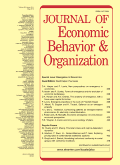
JOURNAL OF ECONOMIC BEHAVIOR & ORGANIZATION
Bridging Theory and Practice in Economic BehaviorJOURNAL OF ECONOMIC BEHAVIOR & ORGANIZATION, published by Elsevier, stands as a pivotal platform at the intersection of economics, organizational behavior, and human resource management. Established in 1980 and continuing its impactful contribution to scholarship, this journal holds a prestigious Q1 ranking in both its primary categories for 2023, signifying its significance in advancing research in these fields. The journal’s rigorous peer-review process ensures the publication of high-quality articles that delve into the complexities of economic decision-making and organizational dynamics. Researchers and practitioners alike benefit from its comprehensive analyses and innovative insights, making it an essential resource for those seeking to understand the intricate interplay between economic behavior and organizational structures. With its wide-reaching implications and adherence to excellence, the JOURNAL OF ECONOMIC BEHAVIOR & ORGANIZATION is poised to continue shaping the landscape of economic and organizational research through 2024 and beyond.